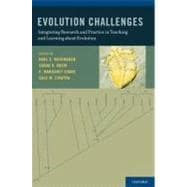
Note: Supplemental materials are not guaranteed with Rental or Used book purchases.
Purchase Benefits
What is included with this book?
| Foreword | p. ix |
| Preface | p. xv |
| Acknowledgments | p. xvii |
| Contributors | p. xix |
| Folk Theories, Conceptual and Perceptual Constraints | |
| "Two-Thousand Years of Stasis": How Psychological Essentialism Impedes Evolutionary Understanding | p. 3 |
| Trees, Fish, and Other Fictions: Folk Biological Thought and Its Implications for Understanding Evolutionary Biology | p. 22 |
| Cognitive Constraints on the Understanding and Acceptance of Evolution | p. 47 |
| Teleological Minds: How Natural Intuitions about Agency and Purpose Influence Learning about Evolution | p. 66 |
| The Promise and Challenges of Introducing Tree Thinking into Evolution Education | p. 93 |
| Narrative Spaces in the Representation and Understanding of Evolution | p. 119 |
| Misunderstanding Emergent Causal Mechanism in Natural Selection | p. 145 |
| Encountering Counterintuitive Ideas: Constructing a Developmental Learning Progression for Evolution Understanding | p. 174 |
| Commentary on Section I: Constrained Learning: Reframing the Problem of Evolution Understanding and Implications for Science Education | p. 200 |
| Epistemological Issues | |
| Model-Based Instruction: Fostering Change in Evolutionary Conceptions and in Epistemic Practices | p. 211 |
| Why Don't Americans Accept Evolution as Much as People in Peer Nations Do? A Theory (Reinforced Theistic Manifest Destiny) and Some Pertinent Evidence | p. 233 |
| Heuristics and the Counterintuitive in Science and Religion | p. 270 |
| Implementing Education in Evolution: Formal Education | |
| Challenges and Opportunities for Teaching and Designing Effective K-12 Evolution Curricula | p. 287 |
| Why Don't Undergraduates Really "Get" Evolution? What Can Faculty Do? | p. 311 |
| An Intentional Approach to Teaching Evolution: Making Students Aware of the Factors Influencing Learning of Microevolution and Macroevolution | p. 348 |
| Implementing Education in Evolution: Informal Education | |
| Pattern and Process: Natural History Museum Exhibits on Evolution | p. 375 |
| Walking Whales and Singing Flies: An Evolution Exhibit and Assessment of Its Impact | p. 389 |
| Making Connections: Evolution and the Nature and Process of Science | p. 410 |
| Commentary on Section II: Bringing Multiple Levels of Analysis to Bear on Evolution Teaching and Learning | p. 428 |
| Author Index | p. 443 |
| Subject Index | p. 453 |
| Table of Contents provided by Ingram. All Rights Reserved. |
The New copy of this book will include any supplemental materials advertised. Please check the title of the book to determine if it should include any access cards, study guides, lab manuals, CDs, etc.
The Used, Rental and eBook copies of this book are not guaranteed to include any supplemental materials. Typically, only the book itself is included. This is true even if the title states it includes any access cards, study guides, lab manuals, CDs, etc.